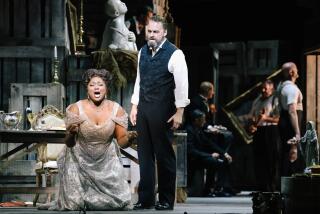Obituaries : Alfredo Kraus; Spanish Operatic Tenor
- Share via
Spanish opera singer Alfredo Kraus, considered to be among the world’s great lyric tenors, died Friday at his Madrid home after a long illness. He was 71.
Kraus never revealed the nature of his malady, but was known to have fallen into a deep depression after the death of his wife, Rosa, in 1997, just after the singer’s international 40th anniversary tour. News reports said he had been treated for pancreatic cancer in the United States and Spain.
In a statement Friday, Peter Hemmings, general director of the Los Angeles Opera, called Kraus “an extraordinary artist who made an enormous contribution to the advancement of opera.”
Kraus, described as possessing the aristocratic flair of a “Spanish grandee,” never accepted a supporting role. He also spurned all offers to perform in popular musicals or mass appeal opera concerts.
In 1985, former Times music critic Martin Bernheimer wrote: “There is nothing ordinary, nothing usual about Alfredo Kraus. . . . His voice remains fresh, pliant, responsive to myriad expressive and dynamic nuances. . . . He can wring pathos from a tired cliche, make even the flabbiest rhetorical gesture seem heroic.”
While a favorite of critics, Kraus’ steadfast refusal to court the “pop opera” audience may have played a role in preventing him from enjoying household name status like fellow tenors Luciano Pavarotti, Placido Domingo and Jose Carreras.
Kraus’ resentment of that difference became clear in 1990, when Kraus criticized the “Three Tenors” for their open-air concert in Madrid on the eve of the 1990 World Cup soccer final. “I don’t think I offend anyone by saying that the concert was more of a show of easy music for an easy public, a festive public that goes to a show to enjoy itself and may even be eating a sandwich while doing so,” Kraus told the New York Times.
In 1992, the spat continued. Carreras, who was serving as musical director for that year’s Summer Olympic Games in Barcelona, failed to invite Kraus to perform at the opening concert of the Games. Instead, Carreras invited Domingo, soprano Monserrat Caballe and mezzo-soprano Teresa Berganza to join him for a lip-synced performance of a recorded operatic medley. Though a constant critic of such concerts, Kraus said he was “hurt” by the snub.
That “tenor tantrum,” as one news headline dubbed it, ended when Kraus accepted a belated invitation to perform with the group.
Kraus was born Alfredo Kraus Trujillo in 1927 in Las Palmas in the Canary Islands. His Austrian father adopted Spanish nationality. As a youth, Kraus loved the songs of his native islands, and seized any opportunity to sing in local performances.
Friends urged him to pursue a singing career, but Kraus followed his father’s wishes and pursued a degree in electrical engineering. While a student, Kraus was called to serve his compulsory time with the army in Spain. While training as an army officer he was sent to Barcelona, where he found his first voice teacher, “a wonderful, mad Russian lady” named Gali Markoff.
After completing his academic studies and army service, Kraus spent two years of career indecision, then, in 1955, traveled to Milan to determine whether he had what it took to forge a professional opera career.
He received much encouragement in Milan and, after winning a silver medal in the Geneva Competition, Kraus was engaged by a small Italian opera company to sing the role of the Duke of Mantua in “Rigoletto.” He made his opera debut with that company in Cairo in 1956.
That year Kraus made his Italian debut at La Fenice in Venice, singing Alfredo in “La Traviata” opposite Renata Scotto. In 1958, he traveled to Lisbon to perform three more “Traviatas,” this time with Maria Callas.
The tenor made his U.S. debut with the Chicago Lyric Opera in 1962. Two years later came his first appearance with the Metropolitan Opera, once again singing the duke in “Rigoletto,” and Don Ottavio in “Don Giovanni.”
Kraus maintained that it was emotion, not precision, that made an opera singer great. “For me, to live and breathe a role is far more important than singing it to perfection, because a perfect voice can be as dull as dishwater,” he has said. “What the public must understand is that singing is a matter of musicality, sensitivity, personality, and above all, maturity.”
More to Read
The biggest entertainment stories
Get our big stories about Hollywood, film, television, music, arts, culture and more right in your inbox as soon as they publish.
You may occasionally receive promotional content from the Los Angeles Times.










